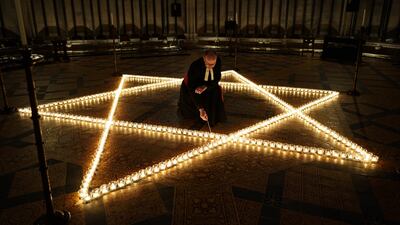European Union leaders have pledged to confront the rise of anti-Semitism and Holocaust denial witnessed during the coronavirus pandemic.
European Council chief Charles Michel said on Wednesday, the eve of the annual commemorations of Auschwitz’s liberation, the lessons of the Holocaust are now “more relevant than ever”.
“First, because Jewish people feel threatened, and they are threatened,” he said. “They are even attacked in Europe. Just because they are Jewish. We do not accept this. We will never accept it.”
Mr Michel spoke at an online event organised by the European Jewish Congress, which was also attended by European Commission President Ursula von der Leyen and European Parliament President Roberta Metsola.
The Commission — the EU’s executive branch — presented a new strategy last year to better tackle hate speech, raise awareness about Jewish life, protect places of worship and ensure the Holocaust isn’t forgotten. According to Europe’s Fundamental Rights Agency, nine out of 10 Jews think anti-Semitism has increased in their country and is a serious problem.
In a speech commemorating the victims of the holocaust, UN Secretary General Antonio Guterres said he was alarmed to learn recently that barely half of all adults worldwide have heard of the Holocaust, which saw the murder of six million Jews, comprising one-third of the Jewish people and millions of others during the Second World War. He said the lack of knowledge among the younger generations “is worse still”.
With the wide circulation of false information about the Holocaust on the internet, European Jewish Congress President Moshe Kantor cited the vast amount of time spent online during the coronavirus pandemic as one of the reasons for the rise in anti-Semitism.
He asked EU leaders to increase their efforts to connect with European youth to make them more aware of the Holocaust.
“We have to understand better their concerns and aspirations and speak to them in their language,” he said. “There has been a tsunami of lies about Jews, Israel and the Holocaust over the last couple of years, so we have to create new strategies to reach those who are consuming this information innocently.”
With France holding the EU’s rotating presidency, the European Jewish Congress’ ceremony focused on the Holocaust in France, on the 80th anniversary of the Velodrome d’Hiver round-up, a mass arrest of Jews by French police in Paris in 1942.
French President Emmanuel Macron said he has taken action to dissolve groups promoting hatred and deplored that “falsifications of history are back”.
Ceremony at Auschwitz death camp site
Due to the coronavirus pandemic, many International Holocaust Remembrance Day commemorations on Thursday will be held online. A small ceremony, however, will take place at the site of the former Auschwitz death camp, where Second World War Nazi German forces killed 1.1 million people in occupied Poland. The memorial site reopened in June.
The UN General Assembly adopted a resolution in November 2005 establishing the annual commemoration and chose January 27, the day that Auschwitz-Birkenau was liberated by Soviet troops in 1945. Earlier this month, the UN also adopted a resolution condemning Holocaust denial, the resolution put forward by Israel asks countries around the world “to take active measures to combat antisemitism and Holocaust denial or distortion”.
“Our response to ignorance must be education,” Mr Guterres said. “Governments everywhere have a responsibility to teach about the horrors of the Holocaust.”
In all, about six million European Jews and millions of other people were killed by the Germans and their collaborators during the Holocaust. Some 1.5 million were children.

